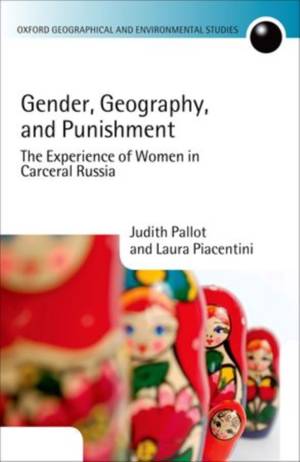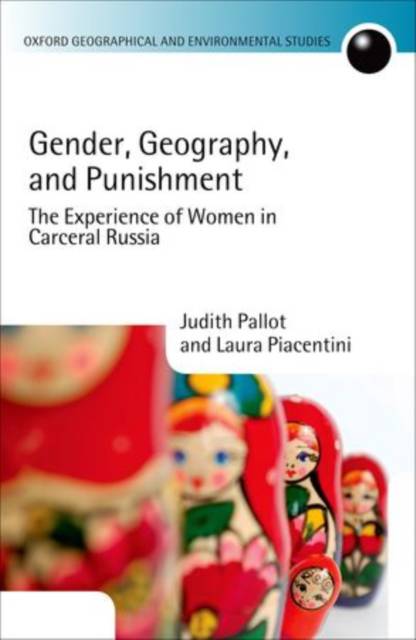
- Retrait gratuit dans votre magasin Club
- 7.000.000 titres dans notre catalogue
- Payer en toute sécurité
- Toujours un magasin près de chez vous
- Retrait gratuit dans votre magasin Club
- 7.000.000 titres dans notre catalogue
- Payer en toute sécurité
- Toujours un magasin près de chez vous
Gender, Geography, and Punishment
The Experience of Women in Carceral Russia
Judith Pallot, Laura Piacentini
202,45 €
+ 404 points
Description
This book is the first of its kind that brings together human geography and the sociology of punishment to explore the relationship between distance and punishment in con-temporary Russia. Using established penological and geographical theories, the book presents in-depth empirical research to show how the experiences of women prisoners are shaped by the distances that the Russian penal service sends prisoners to serve their sentences. Its most eye-catching feature is its use of interviews conducted by the authors and their research team with adult and juvenile women prisoners, ex-prisoners and prison officers in penal facilities in different regions of the Russian Federation between 2006 and 2010. It includes discussion of the impact of Russia's distinctive penal geography on pris-oners' family relationships, how women prisoners' sense of place and gender identities are shaped and re-shaped on their journey from pre-trial facility to 'correction colony' to release, and the
social hierarchies, relationships and practices that characterise Russia's penal institutions for women. The authors are both experienced researchers in Russia. The book brings together their complementary disciplinary expertise in the development of the concept of 'coerced mobilization' to explore Russia's punishment culture. The book argues that Russia's inherited geography of penality, combined with traditional ideas about women's role that shape the penal service's management of women prisoners, add to their 'pains of imprisonment'. Crucially, the authors show how these factors are con-straining the Russian penal service's ability to implement successive reforms aimed at humanizing Russia's notoriously tough prisons. Russian imprisonment as it relates to women is, they believe, an area of significant concern for lawmakers in that country as well as to human rights campaigners, geographers interested in space and power, and scholars studying the post-Soviet system.
social hierarchies, relationships and practices that characterise Russia's penal institutions for women. The authors are both experienced researchers in Russia. The book brings together their complementary disciplinary expertise in the development of the concept of 'coerced mobilization' to explore Russia's punishment culture. The book argues that Russia's inherited geography of penality, combined with traditional ideas about women's role that shape the penal service's management of women prisoners, add to their 'pains of imprisonment'. Crucially, the authors show how these factors are con-straining the Russian penal service's ability to implement successive reforms aimed at humanizing Russia's notoriously tough prisons. Russian imprisonment as it relates to women is, they believe, an area of significant concern for lawmakers in that country as well as to human rights campaigners, geographers interested in space and power, and scholars studying the post-Soviet system.
Spécifications
Parties prenantes
- Auteur(s) :
- Editeur:
Contenu
- Nombre de pages :
- 360
- Langue:
- Anglais
- Collection :
Caractéristiques
- EAN:
- 9780199658619
- Date de parution :
- 12-12-12
- Format:
- Livre relié
- Format numérique:
- Genaaid
- Dimensions :
- 236 mm x 163 mm
- Poids :
- 609 g







